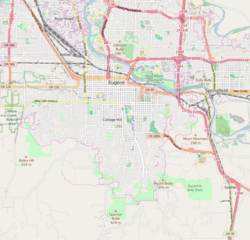Spencer Butte
| Spencer Butte | |
|---|---|

View of Eugene from Skinner Butte, with Spencer Butte in the distance
|
|
|
Spencer Butte
|
|
| Location | South of Eugene,Oregon, USA |
| Coordinates | 43°58′59″N 123°05′45″W / 43.9831°N 123.0957°WCoordinates: 43°58′59″N 123°05′45″W / 43.9831°N 123.0957°W |
| Range | Cascade Volcanoes |
| Part of | Little Butte Volcanics |
| Highest point | 2,058 feet (627 m) |
| Formed by | Intrusion of lava through sandstone base, and subsequent erosion of sandstone |
| Geology | Butte |
| Age | approximately 23 to 30 million years |
| Orogeny | Phanerozoic orogen |
Spencer Butte is a prominent landmark in Lane County, Oregon, United States, described in the National Geodetic Survey as "a prominent timbered butte with a bare rocky summit" on the southern edge of Eugene, with an elevation of 2,058 feet (627 m). Spencer Butte is accessible from Spencer Butte Park and has several hiking trails to the summit. The tree cover on the butte is predominantly Douglas-fir, however the butte is treeless at its summit. The butte is the tallest point visible when looking south from downtown Eugene.
The butte was called Champ-a te or Cham-o-tee by the native Kalapuya, meaning rattlesnake.
One popular theory is that Spencer Butte was named for a young Englishman of the Hudson's Bay Company named Spencer, who was said to have been killed by the Kalapuya after climbing the hill alone. Another, less popular theory holds that the butte was named after Secretary of War John C. Spencer in July 1845 by Elijah White. Spencer was no longer Secretary of War by 1845, however.
...
Wikipedia

